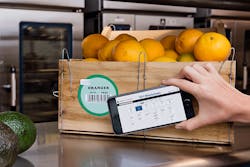Top Food Manufacturers Collaborate on Blockchain Technology for Safety
Walmart, Dole, Nestle, Unilever, Tyson Foods and other food companies will collaborate with IBM on blockchain technology with the aim of strengthening consumer confidence in the global food system.
Other companies include Driscoll’s, Golden State Foods, McCormick and Company and McLane Company.
The need to improve food safety is critical/ Annually one-in-ten people fall ill - and 400,000 die - due to contaminated food. With the current system it can take weeks to identify the precise point of contamination. A recent example is that it took more than two months to identify the farm source of contamination in a recent incidence of salmonella in papayas.
A solution to improve traceability is blockchain. Blockchain is ideally suited to help address these challenges because it establishes a trusted environment for all transactions. In the case of the global food supply chain, all participants -growers, suppliers, processors, distributors, retailers, regulators and consumers - can gain permissioned access to known and trusted information regarding the origin and state of food for their transactions. This can enable food providers and other members of the ecosystem to use a blockchain network to trace contaminated product to its source in a short amount of time to ensure safe removal from store shelves and stem the spread of illnesses.
“Unlike any technology before it, blockchain is transforming the way like-minded organizations come together and enabling a new level of trust based on a single view of the truth,” says Marie Wieck, general manager, IBM Blockchain.
Strengthening Trust Across the Global Food Supply Ecosystem
In parallel trials in China and the U.S., IBM and Walmart recently demonstrated that blockchain can be used to track a product from the farm through every stage of the supply chain, right to the retail shelf, in seconds instead of days or weeks.
These trials also demonstrated that stakeholders throughout the global food supply chain view food safety as a collaborative issue, rather than a competitive one, and are willing to work together to improve the food system for everyone.
“As an advocate for greater transparency in the food system to benefit customers, Walmart looks forward to expanding on our initial work by collaborating with others to accelerate exploration on how this technology can be used as a more effective food traceability and food safety tool,” says Frank Yiannas, vice president, food safety, Walmart. “Blockchain technology enables a new era of end-to-end transparency in the global food system – equivalent to shining a light on food ecosystem participants that will further promote responsible actions and behaviors. It also allows all participants to share information rapidly and with confidence across a strong trusted network. This is critical to ensuring that the global food system remains safe for all.”
Expanding the Blockchain Ecosystem Across Academia
To help meet the increasing demand for a skilled technical workforce trained in blockchain, IBM is making available a wide range of resources including software, training and professional partnerships free of charge to more than 1,000 universities in the IBM Academic Initiative. Offerings include six months of access to the IBM Cloud for use of the IBM Blockchain cloud sandbox to help students hone development skills.
IBM is also working with select universities including Baruch College/CUNY, Fordham University, University of Arkansas, University at Buffalo and University of British Columbia to fund research grants, develop customized curricula and host workshops.
